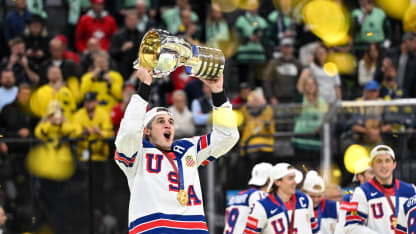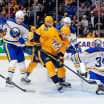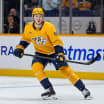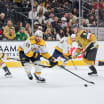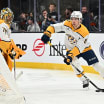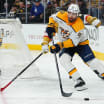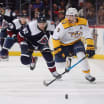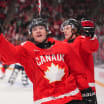In 1933, the United States defeated Canada to win Gold and capture their first World Championship title.
Then, 91 years passed without another first-place medal.
That was, until, five members of the Predators organization helped USA Hockey to Gold at the IIHF World Championship for the first time in 92 tries last month.
Preds defenseman Brady Skjei, center Michael McCarron, Assistant Coach - Video Lawrence Feloney, Head Equipment Manager Pete Rogers and Assistant General Manager/Director of Scouting Jeff Kealty all finished the tournament in Stockholm with Gold around their necks - a feat none of them will be forgetting anytime soon.
“To be the first team to win it in 92 years, it was pretty special and just well worth everything to travel, getting over there - it was all so much fun,” Skjei said upon returning to Nashville. “I'm very glad that I got asked to go and committed to the team, and it was just a ton of fun.”
“It's a huge thing to have in your back pocket heading forward,” McCarron said. “It’s very cool to do something for your country that hasn't been done in 92 years.”
While the 1-0 victory in overtime against Switzerland for Gold was certainly a long time coming, Kealty, who served as the team’s general manager and built this year’s squad from the ground up, says the standard for USA Hockey nowadays is to not only compete at the world’s top tournaments, but win.
Pitted against a number of European squads who spend months together training for the World Championship, the United States had a limited amount of time to mesh collectively as a team with players joining the group from their respective NHL clubs once their season was done.
And while the Americans didn’t have an ideal start to the tournament, when the stakes were highest, they performed at their very best.
“We had a lot of great players stand up and say that they wanted to play for USA Hockey, play for a Gold medal, and all the credit in the world to them and the coaches,” Kealty said. “It’s one thing to be able to put the team in place, but then it's another thing to execute and get it down the ice and to be able to watch. I told [San Jose Sharks and Team USA Head Coach] Ryan Warsofsky afterwards it was just an absolute treat to be able to watch this team go through some adversity early on, get better and better and better, to turn around where we had a lot of confidence going into that medal round and we could get it done. It all fell into place, and it was just an unbelievable experience.”
The United States began the tournament with a 5-0 victory over Denmark and a 6-0 triumph against Hungary, but the Americans were shut out, 3-0, by Switzerland before blowing a 5-1 lead and requiring overtime to defeat Norway.
That first loss - and subsequent scare - however, may have been exactly what the team needed to realize their potential.
“When that happened, I honestly thought that was probably the best thing for us,” Skjei said. “I thought that loss, and then winning in overtime to Norway kind of opened everyone's eyes a little bit and realizing we’ve really got to play our best to win.”
From there, that’s exactly what the U.S. did.
A 6-3 win over Germany was followed by a 6-1 victory against Kazakhstan, and then a 5-2 triumph versus Czechia, the latter of which concluded the preliminary round with their best effort yet.
“The advice that I got from everybody going into this was that it's a build up to the medal round,” Kealty said. “It's really a build up to that quarterfinal game, because if you get through that, then you're in the final four. I think that if you watch the way it unfolded, that's really what our guys were able to do. They got better and better. They learned from some early adversity and built toward that quarterfinal.”
The Americans topped Preds goaltender Juuse Saros and Finland, 5-2, before defeating Filip Forsberg’s Swedes by a 6-2 count - in Stockholm, no less - for a date in the final against Switzerland.
Neither country was able to find the back of the net through the finale’s first 60 minutes, but in overtime, Skjei started a breakout with a pass to Utah’s Logan Cooley who found Buffalo forward Tage Thompson - and the Sabres star ripped a shot into the twine to finish the job.
Skjei, 31 years of age, and McCarron, 30, were the two oldest players on the young squad, roles the pair embraced as they helped lead the team through the lows - followed by the highs.
Combine that with having Rogers, Feloney and Kealty around as well, and the Preds flavor was a welcomed attribute in a setting that often lacks ease and comfort in the early going.
“It was a good familiarity, because going into it I didn't really know anybody on the team,” Skjei said. “I was somehow the oldest guy on the team. It felt weird. It was crazy. It's the new generation of USA Hockey players, and I didn't really know many of them. So, it was great to get to know all them and to kind of be that older guy and bring a little leadership to the team. But it was awesome to have some familiarity with Mac and with Pete and Law and Kelts. It was great, especially after the season that we kind of had in Nashville to end on a good note. It felt really good.”

